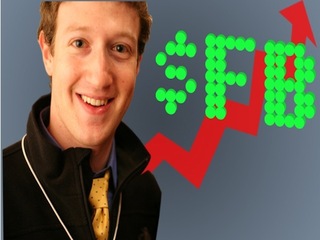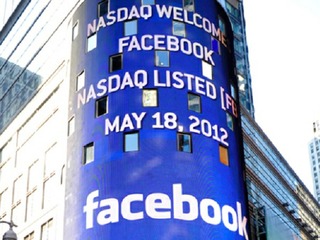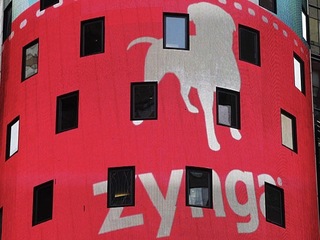Pitchbook survey: VCs see AI as high growth but also overinvested
The biggest focus areas for AI investing are healthcare and biotech
Read more...
It appears that it took one day of trading before investors saw the underwriter's heavy sale of Facebook stock as a sign to abandon the newly minted IPO.
A new report from Reuters suggests that the action of one the company's bankers may have pushed the social network's shares over a cliff.
In the days before Facebook's IPO, the lead underwriter for the deal told major clients it was reducing its revenue forecast for the company, according to Reuters.
Morgan Stanley and other underwriters for the IPO apparently shaved down their outlook for the company just before it went public and once investors heard the rumblings more people switched their 'buys' to 'sells.'
Reuters cited unnamed investors on Tuesday, saying that the action of dropping outlook that close to the IPO was "highly unusual" and may have contributed to Facebook's disappointing stock performance since Friday's debut on the Nasdaq.

The company's stock (NASDAQ:FB) felt a sharp drop from its $38 IPO price -- it was an 11% decline Monday and another 3%+ in Tuesday morning trading. This decline as chopped more than $10 billion off of the company's market cap.
JPMorgan Chase and Goldman Sachs, also major underwriters on the IPO, revised their estimates after the filing and each of the companies bumped up the number of shares they were looking to unload at the time of IPO (at the $38 price.)
The revised estimate came from consumer Internet analyst, Scott Devitt, after Facebook filed its amended S-1 regarding the less-than-stellar mobile outlook.
The update included details stating that the mobile focus for the company has drastically slowed the pace that the company adds new users and could end up hurting the company revenue in the long run.
Even since the original Facebook IPO filing, it has been understood that the company has still been grappling with how to truly monetize its mobile ecosphere since the platform doesn't incorporate Sponsored ads at the same rate as the browser-based platform.
Facebook has looked at the news feed to inject its paid advertisements rather than banner or side-bar ads but finding the right combination and testing it has not been as quick of a process as some may wish.
In that mobile S-1 filing, the company stated that it does "not currently directly generate any meaningful revenue from the use of Facebook mobile products, and our ability to do so successfully is unproven."
The filing goes on to point out that "the recent trend of our daily active users (DAUs) increasing more rapidly than the increase in the number of ads delivered. If users increasingly access Facebook mobile products as a substitute for access through personal computers, and if we are unable to successfully implement monetization strategies for our mobile users . . .”
It was this S-1 update that seemed to really throw up some red flags for Morgan Stanley's analysts and, allegedly, caused Devitt to amend the company outlook.
Amending a prospectus during a roadshow (the 1-2 weeks prior to the pricing of shares and actual IPO debut) and would clearly be a sign to investors that the company was not as bullish as once thought.
Thus far, Morgan Stanley, JPMorgan and Goldman each declined to comment on this matter "at this time."
But in the same S-1 update that included the mobile outlook, the underwritters increased the number of shares.
Facebook explained in the update that it granted about $796 million in restricted stock units to employees less than a prior.
These restricted stock units could be worth anywhere from $707 million to $884 million based on Facebook’s expected $28 to 35 price range per share.
The filing specifically stated that: “On May 3, 2012, we granted an aggregate of 25,257,815 RSUs. We will determine the fair value of these grants during the second quarter. If the fair value of our Class A common stock was $31.50, the midpoint of the price range set forth on the cover page of this prospectus, the aggregate grant date fair value would be approximately $796 million.”
Then, on Wednesday morning, Facebook and the underwritters added more shares to the Friday IPO.
That update, two days prior to the IPO, bumped shares up another 25% to 421.2 million shares.
This brought the amount raised on Friday to $16 billion, making it the largest tech IPO in history, and the third largest U.S. IPO ever, -- just following the $19.7 billion raised by Visa in March 2008, and the $18.1 billion raised by automaker General Motors in November 2010.
The company stated in the filing that the additional shares will be sold by selling shareholders of the company, not by the company itself, which will stick with previous plans to sell 180 million shares to the public.
Some early investors in Facebook also increased the number of shares sold, including James Breyer of Accel Partners, who the largest shareholder other than Zuckerberg.
Goldman Sachs also upped its selling number, increasing its stake sale to 28.7 million, more than twice the 13.2 million the investment bank had initially planned to sell.
Since companies do not make their own financial forecasts prior to an IPO, and underwriters are barred from issuing recommendations from the SEC on the stock until 40 days after it begins trading, getting the actual prospectus is challenging.
So far it is unclear just how many people heard of or received this information from Morgan Stanley.
In the coming weeks we will likely hear Morgan Stanley's version of the events leading up to the Facebook debut, and the SEC could even be involved if any reports violate disclosure laws, in this stinky situation.
(Image Source: business.financialpost.com)
The biggest focus areas for AI investing are healthcare and biotech
Read more...It will complete and submit forms, and integrate with state benefit systems
Read more...The bill would require a report on how these industries use AI to valuate homes and underwrite loans
Read more...


